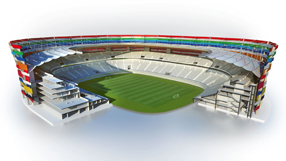Qatar stadium air-conditioning 'unnecessary'
Qatar should rethink its plans to build air-conditioned stadiums for the 2022 World Cup and use naturally cooled venues instead, according to the architect commissioned to design one of its arenas.

John Barrow, senior principal with Populous architects who planned and designed the 2012 Olympic Stadium in London and Johannesburg's Soccer City World Cup venue, said it would be viable to reach acceptable temperatures without using air conditioning.
"The organisers want to have the big showcase stadium with air conditioning but we are fighting hard to persuade them that you don't need to have it," he told the International Football Arena conference.
"It's not good from a long term sustainability point of view," said Barrow, whose company are designing the Sports City arena.
The idea of using air conditioned stadiums was the centrepiece of Qatar's successful bid to host the tournament, which is due to be played in summer despite the scorching heat.
Ghana's Asamoah Gyan, who is playing for Al Ain in the neighbouring United Arab Emirates, has expressed his concerns about the welfare of players in such conditions and thinks air conditioning is the only solution.
"It was difficult when I first got there because of the weather and the climate and everything, but I think in November, December, it is going to get easier," Gyan, who is on loan from Sunderland, told Reuters.
"But I do think the climate for the World Cup in Qatar is going to be really, really difficult.
Get FourFourTwo Newsletter
The best features, fun and footballing quizzes, straight to your inbox every week.
"They are putting air conditioning in the the stadiums and I think maybe it can help the football there because without that I don't think people can survive because it's really, really hot."
However, Barrow said that, assuming the matches were played at night, the temperature inside the stadium could be reduced by around 20 Celsius without air conditioning.
He added: "It's not just the temperature that matters but relative humidity, air movement, moisture in the air.
"It's a question of using natural convection in the right way, wind towers which naturally ventilate and screening the stadium so it doesn't absorb the heat during the day."
Barrow said that careful designing of training pitches and other facilities was also fundamental in reducing the affects of the heat.
"If you walk across an unshaded car park when it's 55 Celsius, you are going to need a change of clothes immediately.
"In Qatar, it's a pre-requisite to get the shading right and the space between buildings."
